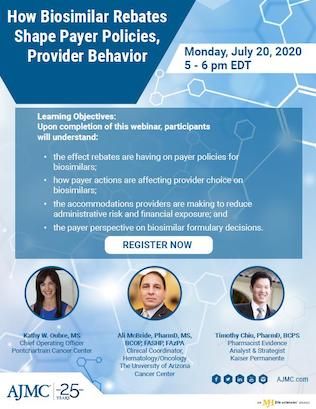- Bone Health
- Immunology
- Hematology
- Respiratory
- Dermatology
- Diabetes
- Gastroenterology
- Neurology
- Oncology
- Ophthalmology
- Rare Disease
- Rheumatology
Webinar: How Biosimilar Rebates Shape Payer Policies, Provider Behavior
An upcoming webinar from MJH Life Sciences™ will address the payer rebate deals that limit provider choice of biosimilars and complicate clinical pharmacy operations.
More biosimilars are being launched, but numerous factors affect whether they become available in the clinic. On Monday, July 20, 2020, from 5 to 6 pm EST, MJH Life Sciences™ is hosting a webinar about how biosimilar rebates shape payer policies and provider options.
The program features a panel of leading experts on oncology practice and payment who will provide perspectives on how the structuring of biosimilar payment contracts at the payer level is affecting biosimilar access and cost at the provider level.
With more biosimilars, the expectation is that costs will decline and providers will have more freedom to choose the most appropriate medications for their patients. However, marketplace dynamics have made that ideal a more complicated objective than anticipated.
Providers who want to use biosimilars find their choices of these medicines often are determined not by clinical concerns but by regional payer-by-payer contracts that necessitate careful pharmacy planning, staff training, and sometimes, compromise.
Hear what our panelists have to say about these issues and how they deal with them. They are Kathy W. Oubre, MS, chief operating officer of the Pontchartrain Cancer Center in Louisiana; Ali McBride, PharmD, MS, BCOP, FASHP, FAzPA, clinical coordinator of Hematology/Oncology for The University of Arizona Cancer Center; and Timothy Chiu, PharmD, BCPS, pharmacist evidence analyst and strategist for Kaiser Permanente.
Click here for registration information.
Newsletter
Where clinical, regulatory, and economic perspectives converge—sign up for Center for Biosimilars® emails to get expert insights on emerging treatment paradigms, biosimilar policy, and real-world outcomes that shape patient care.

